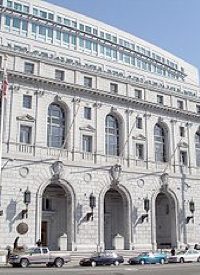
The California Supreme Court will be hearing arguments from gay marriage opponents next week in the Proposition 8 court battle. According to The Blaze, this next stage in the court battle will “shed light on whether the voter-approved measure’s backers have legal authority to appeal the federal ruling that overturned Proposition 8.”
Proposition 8 is a voter-approved ban against same-sex marriage. California residents voted to add the following words to the California state constitution:
Only marriage between a man and a woman is valid or recognized in California.
Proposition 8 was written in exactly the same way as California’s Proposition 22, which, as an ordinary statute, was invalidated by the State Supreme Court.
The passed amendment overturned the California Supreme Court’s ruling of In re Marriage Cases that same-sex couples have a constitutional right to marry. Proposition 8 took immediate effect the day after its passage on November 5, 2008, when 52 percent of voters voted in favor of Proposition 8.
Opponents of Proposition 8 launched a number of legal battles against the measure. In Strauss v. Horton, the court upheld Proposition 8, but permitted already existing same-sex marriages to remain in place under the Grandfather clause principle.
However, the ban was overturned on August 4, 2010 by United States district court Judge Vaughn R. Walker in the case of Perry v. Schwarzenegger. Walker ruled that the proposition violated both Due Process and Equal Protection clauses in the Constitution. He then issued an injunction against enforcing Proposition 8, as well as a stay to determine the suspension of his ruling pending appeal. That stay was kept in place by the Ninth Circuit Court of Appeals while the decision is pending appeal.
Judge Walker’s ruling provoked some controversy when some questioned whether Walker’s ruling was influence by his own long-term relationship with another man.
Still, the court battle has raged on. Next Tuesday, the California Supreme Court is scheduled to hear an hour’s worth of arguments on the subject. As the federal appeals court continues to weight the constitutionality of Proposition 8, it has asked that the state court weigh in on the subject as well before it makes a final decision.
The Blaze explains:
The 9th U.S. Circuit Court of Appeals has expressed doubts about the ability of Proposition 8‘s sponsors to challenge the lower court ruling absent the involvement of California’s governor or attorney general, both of whom refused to appeal a federal judge‘s August 2010 decision striking down the ban as a violation of gay Californians’ civil rights.
The court punted the question to the California Supreme Court earlier this year, saying it was a matter of state law.
The measure is defended by lawyers representing a number of religious and conservative groups who claim that they are qualified to represent all supporters of the proposition.
Andy Pugno, legal counsel for the Proposition 8 coalition indicated in a letter to Prop 8 supporters, “This is a pivotal hearing for us as we continue to fight to uphold the People’s vote to restore traditional marriage in California against these ferocious attacks. We simply cannot allow our opponents to manipulate the legal system to the point where there is nobody left to defend the People.”
However, lawyers for the same sex couples who have mounted a legal challenge to Proposition 8 contend that ballot initiative proponents cannot demonstrate that they would be “harmed” if the same-sex marriage ban was declared to be unconstitutional. As noted by legal experts, in order to effectively be eligible to appeal in federal court, parties must be able to show a specific harm has been inflicted as a result.
If the California Supreme Court does in fact rule that proponents of the ban did not have a right to appeal, and the Ninth Circuit as well as the United States Supreme Court agrees, same-sex marriages would be permitted to resume in California.
Marc Spindelman of Ohio University Moritz College of Law explains the difficulties of the case.
“What the court has before it are questions about how the state’s direct democracy rules should be understood to sync with its constitutionally-based ideas of representative government.”
He continues, “Who speaks for the people and the state-and when? Can unelected officials determine how state law will be defended? Should they be allowed to defend the law when state officials elected by the people to represent them will not? Are state officials who refuse to defend a legal measure on appeal practically exercising a veto right that the rules of direct democracy in California do not allow?”
Photo: California’s Supreme Court headquarters in San Francisco.




